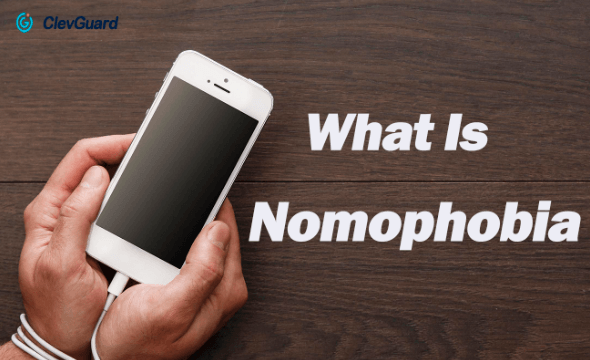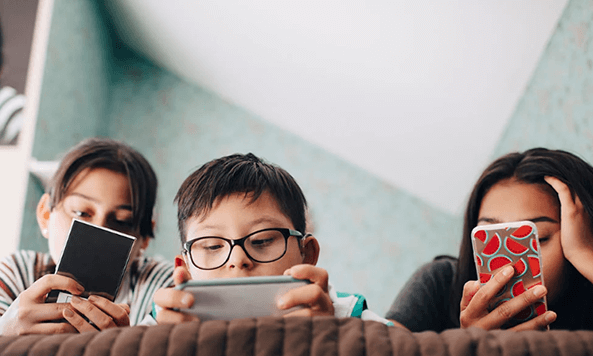ClevGuard Support: Monitor Devices with Others' Permission.
We're all a little too attached to our phones these days, and it's not just adults; kids are feeling it, too. Whether it’s checking social media, texting, or just scrolling through apps, our smartphones have become a big part of our lives. But when that attachment feels more like a necessity, it might signify something deeper: nomophobia, or the fear of being without your phone.
This issue can sneak up on anyone, but it's especially concerning for kids and teens who are still learning how to manage their time and emotions. That’s where parental controls can come in handy.
If you’ve ever felt anxious or uneasy when you’re without your phone, or noticed the same in your child, you’re not alone. In this article, we’re going to break down what nomophobia is, how to spot the signs, and, most importantly, how to use tools like parental controls to overcome nomophobia. Let’s get started!
Table of Contents
Part 1: What Is Nomophobia
Nomophobia is short for "no-mobile-phone phobia", which means the fear of being without your phone. It’s that anxiety you feel when you're without your phone or can’t access it. In today’s world, where we rely on our phones for almost everything, this fear is becoming more common.
Whether it's the fear of missing out on social media updates, not being able to respond to messages, or simply not knowing what to do without your phone in hand, nomophobia can manifest in various ways. It’s not just about having your phone nearby, it’s about the emotional attachment and dependence on it.

Part 2: 8 Nomophobia Symptoms
So, how do you know if you’re experiencing nomophobia? Here are some common signs you can find:
Anxiety Without Your Phone: If you feel uneasy, stressed, or panicked when your phone isn’t around, it might be a sign.
Constantly Checking Your Phone: You find yourself frequently checking for notifications, even when there aren’t any.

Fear of Missing Out: The thought of missing a text, call, or social media update makes you anxious.
Avoiding Phone-Free Situations: You avoid going places or doing activities where you can’t use your phone.
Overuse Phone: You often turn to your phone to avoid dealing with stress, boredom, or negative emotions.

Neglecting Responsibilities: You spend so much time on your phone that it interferes with work, school, or personal relationships.
Sleep Issues: You have trouble sleeping because you’re on your phone late at night, or you wake up frequently to check it.
Physical Discomfort: You might experience restlessness, sweating, or even mild panic when your phone isn't accessible.
Part 3: How to Overcome Nomophobia
Overcoming nomophobia isn’t about ditching your phone entirely—it’s about creating a healthier relationship with it. Here are some tips to help you manage and reduce your phone dependency:
Set Boundaries: Establish specific times or places where phone use is off-limits. Start with small steps, like no phones during meals or in the bedroom.
Use Parental Control apps: There are apps designed to help you manage screen time and block certain apps to reduce distractions. Apps like KidsGuard for Children can encourage more mindful phone use.

Why choose KidsGuard for Children
-
Set screen time limits to help manage how much time you or your kids spend on the phone.
-
Block specific apps and websites to avoid distractions and prevent access to inappropriate content.
-
Lock the phone screen remotely when you need to focus on offline activities.
-
Get detailed activity reports to track your progress and see how well you’re overcoming nomophobia.
-
Track your kid’s location in real time for peace of mind while encouraging healthier phone habits.
Take Regular Breaks: Schedule short breaks from your phone throughout the day. Gradually increase the length of these breaks to build tolerance.
Focus on Offline Activities: Spend more time engaging in face-to-face hobbies or activities, like outdoor walks, reading, or exercising.

Try a Digital Detox: Take a break from your phone for a day or a weekend to reset your habits.
Practice Mindfulness: Be mindful of how often and why you reach for your phone. Before picking it up, ask yourself if it's really necessary or just a habit.
Seek Professional Help: If it’s hard to manage on your own, don’t hesitate to seek help from a therapist or counselor.
FAQs About Nomophobia
Nomophobia, the fear of being without a phone, can lead to anxiety, reduced focus, poor sleep, social isolation, and physical issues like eye strain and neck pain.
If you or your kids are facing this problem, do not ignore it and take some action to handle it.
Staying busy without a phone is easy and rewarding. You can read a book, exercise, or learn a new hobby like cooking or painting. Spend time with family or friends, write in a journal, or tackle a home project. Enjoy nature by taking a walk, hiking, or gardening. These activities keep you engaged, relaxed, and more connected with your surroundings.
Nomophobia is influenced by several factors, like the fear of missing important calls or messages, and a growing dependence on social media and technology for everyday tasks. Anxiety and stress can worsen this, as phones are often used as a coping tool.
FOMO (fear of missing out) also drives the urge to stay constantly updated, while work and study demands further increase reliance on phones. Together, these factors create a cycle of constant connection.
Sum Up
In conclusion, our strong attachment to phones, seen in both adults and kids, reveals a growing concern: nomophobia. This fear of being without a phone can impact daily life, especially for children and teens still learning to balance their time and emotions. Recognizing nomophobia is the first step to tackling it. Using tools like parental controls can help manage this dependency. Try KidsGuard for Children right now, and it won’t let you down.







